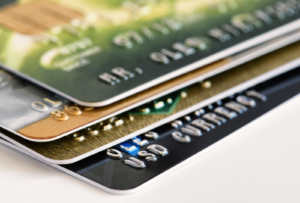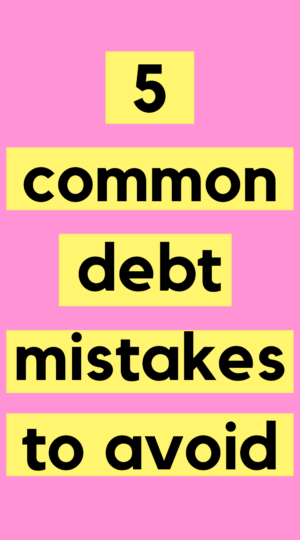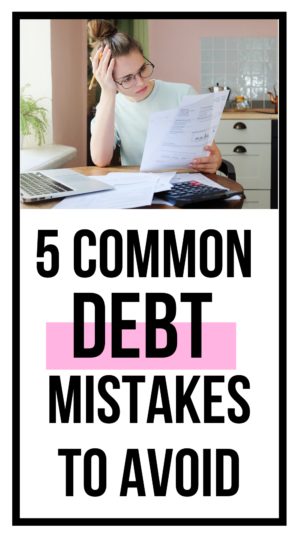
There’s no doubt that debt can feel overwhelming and super stressful. What may start off as a credit card bill here and there may quickly spiral into thousands of dollars, making you feel like you’re drowning in debt. If you’re looking to understand how to pay off debt, you’ve come to the right spot. We’re highlighting 5 of the most common debt mistakes you need to avoid to reach that financial freedom, ASAP!
How to pay off debt: 5 common mistakes to avoid
1. Not paying off high interest debt first
If you’ve got a number of debt repayments to make (i.e. student loans, credit card interest, line of credit, etc.) start with your high interest debt first. Let’s say you have a student loan that has an interest rate of 4% and a credit card that has an interest rate of 19.5%. You’ll be increasing the amount of interest you accumulate on your credit card, fast. Like, really, really fast. Exponentially. You’ll be accumulating interest on your student loans too, but at a lower rate.
By paying down high interest debt first, you give yourself more leeway to put funds towards the actual debt principal, versus having to cover additional interest expenses overtime. Another common method people use when paying down debt, is the debt snowball method. This is where you actually pay off your debt based on the smallest amount owed to largest, regardless of interest rate.
So, let’s say you had the following debt:
Student Loans – $30,000 at 4% interest
Credit Cards – $40,000 at 19.5% interest
Line of Credit – $5,000 at 10% interest
When using the high interest method, you’d pay off your debt in the following order:
- Credit Cards
- Line of Credit
- Student Loans
When using the debt snowball method, you’d pay off your debt in the following order:
- Line of Credit
- Student Loans
- Credit Cards
Though both systems have been tried and tested, we’re firm believers in paying less interest than you have to. Meaning, paying off high interest debt first can save you a ton in the long run.
2. Only paying the minimum off
You’ll likely never be able to pay off your debt and hit that debt free living goal if you’re only paying the minimum off. If you’re in a lot of debt, chances are, your minimum barely even covers the interest fee you’re being charged each month. You need to pay down a hefty amount of your principal debt to see traction for that amount to start going down.
You know what’s frustrating? Paying down the minimum on your credit card debt and student loans, only to see the balance go down LESS than the amount you already paid. So, here’s what that means: the less you pay now, the more you’re actually paying later, because interest continues to accumulate on the total amount you owe.
Though it’s a decent option when money is tight, it doesn’t help pay off debt in the long term. You need to make larger lump sum payments, even if that means resetting your budget so you can find a way to afford it.
(Psst! If you are swamped with debt across student loans, lines of credit, credit cards and more, there will be a time when you’re just paying off the minimum. A good approach to take is to tackle each line of debt at a time, meaning during that period you will likely be paying just the minimum on your other debt repayments. This is fine for the short term, but just remember you never want to be paying the bare minimum on all your accounts, or for the long term!)
3. Not setting a timeline or goal
If you’re trying to understand how to pay off debt and you’re anxiously waiting for that day to come, you need to pick that day.
When you’re trying to tackle your debt, you need to do a full financial assessment and set a goal with a timeline to keep you on track. So, let’s say you’re $50,000 in debt. Your current income may be $35,000 gross per year. You may set a goal to pay off your debt within 3 years. If you do that, you’ll breakdown exactly how much you should be paying down on a monthly basis. Go extreme, and adjust your living style to what your residual income is, vs. paying down your debt with whatever is “left over”. For example:
If your goal is to pay off $50,000 debt within 3 years, that means your monthly payments would be as follows:
$50,000 / (12*3) = $1,388.88, but let’s round up to $1390
That means, you’ll need to make monthly payments of $1390 for the next 36 months (3 years) to reach your goal (excluding interest, for now).
But, this may be your situation:
Current Debt: $50,000
Current Yearly Income: $35,000 gross; $24,000 net
Current Monthly Income (net): $2,000 / month
Total monthly fixed expenses (rent, car, groceries): $1200
Residual Income: $800
Currently, you may be using that residual income to purchase some non-essentials first, like clothes, dinners out, entertainment expenses, etc., which may leave you with a modest $100 per month to put down towards your $50,000 debt. Yikes.
Instead, flip your residual income around to include a required debt payment that comes out of your residual income. So, out of that remaining $800, you may say you’re putting down $500 per month towards your debt payments. Which is about ($1390-$500) $890 below what your monthly payment needs to be, in order to hit that 3 year goal.
At that point, you have a few options.
Option 1: Update your goal and timeline to reflect the amount that you’re able to pay down based on your current income. So, $500/month means you can pay down your debt in 100 months, or 8.3 years at a minimum. Interest will only continue to accumulate, so you’ll need to add on 1 to 2 years at a minimum on top of that. Comfortable with that? Maybe, maybe not.
Option 2: Continue cutting your fixed expenses even more. In this situation, your left with $800 per month to make due with your debt payments and variable expenses. Go through your budget again. Are there things you can cut out that can bring you from an extra $800 a month residual to another few hundred dollars on top of that? Maybe your car. Do you actually need your car? Would you explore the option of giving it up for a few years just to pay down debt? What about your rent? Is it worth it to move back home or grab an apartment with some roommates to decrease your monthly rent payments? The point is, you need to assess based on your current expenses, what’s actually a want vs. need. What are you willing to give up in order to pay down your debt faster?
Option 3: Increase your current income. Which brings us to our next point…
4. Not trying to increase current income
Another common debt mistake to avoid, is assuming you’re confined to your current income only. If you’re making $35,000 a year, and you have $50,000 in debt – that’s tough! You can cut down your expenses a TON, live paycheck to paycheck, and still feel like you’re stuck in years of debt repayment with no light at the end of the tunnel.
There’s a solution to that. Make more money. Easier said than done, right? But actually, it’s not! There’s a ton of ways to make additional income on top of your day job. Here are a few things to consider:
- Ask for a raise or aim to get a job promotion, thus increasing your salary
- Start a side hustle, create a new stream of income; here’s a breakdown of how to make a six figure income yearly
- Get another part-time job
It’s not going to be easy, but where there’s a will, there’s a way. And, if you’re really needing to pay down that debt, grabbing another shift or two can really pay off in the long run. There is SO much content and ideas online nowadays that show you how you can make money on the side online. From surveys to affiliate marketing and more, there are lots of ways to increase your current income.
P.S. Making more money does NOT mean changing your lifestyle. The key here, is to increase your income, and put all that additional money towards your debt. Continue living below your means, even if you can now afford the fancy or flashy thing. Debt down first, enjoy later.
5. Continuing to live off debt
Ready for a major rule breaker you need to avoid? Continuing to live off credit cards. If you’re already in debt, you need to stop living off debt. If you’re maxing out your credit card on the regular to cover your day to day expenses, don’t.
Credit should only be used as a means to build your credit, not live off of it. If you can’t afford something, don’t put it on credit. Only put something on credit if you actually have the money to pay it off immediately after. If you have an unexpected necessary expense come up (i.e your car breaks down), you need to set yourself up for these types of fall backs vs. getting yourself in more debt. And that’s where a rainy day fund, or an emergency fund, comes in.
Emergency funds are a decent amount of cash you keep on hand while you’re paying down debt, in case an unexpected financial emergency comes up. It avoids you having to go into more debt and provides you with some peace of mind throughout your debt repayment journey. Here’s everything you need to know about emergency funds, and 3 simple steps to build one fast.
Beyond emergencies, that also includes avoiding charging luxuries on your credit card too. Yes, that trip to Mexico sounds amazing and you’ve had a hell of a month working. Though you don’t have the funds right now, no harm in putting a couple grand on your credit card, right? You’re already $50K in debt anyways.
Don’t do it! When you feel like you’re drowning in debt, as much as you want to give up and “enjoy a little” every expense adds up. It’s tough, it’s not easy, but that moment you pay down your debt you will feel AMAZING. That’s guaranteed. So long as you set a goal, create a timeline, and stick to your plan, there absolutely is light at the end of that tunnel, so don’t give up! Time for you to take control of your money. Don’t let your money control you.



Another great and helpful article! Thank you!!!
Author
You are so welcome, Mariluz! 🙂
Hi I’d like to really sort out our finances and then finally get out of debt.
Author
Hi Diane! You can do it! It all comes down to creating a plan / budget that works for you. We’ve also got some great resources on emergency funds and investing that you can check out as well! Hope that helps!